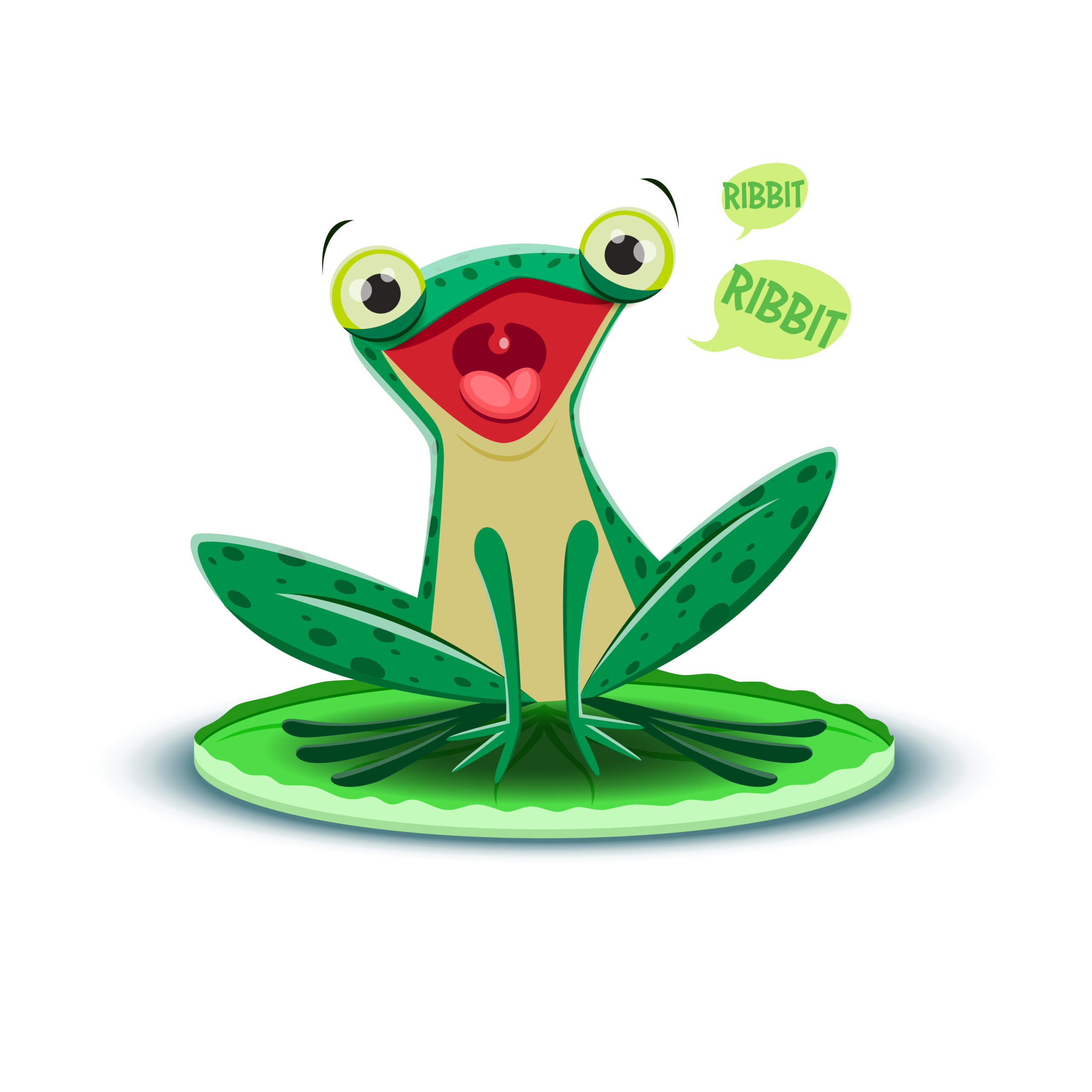Benefits of Frogs in the Garden
Enhancing Ecosystem Health
Frogs can be a great addition to any garden. They serve as natural pest controllers, reducing the need for harmful pesticides.
With their diet of insects like mosquitoes, flies, and beetles, they help keep the garden’s ecosystem balanced.
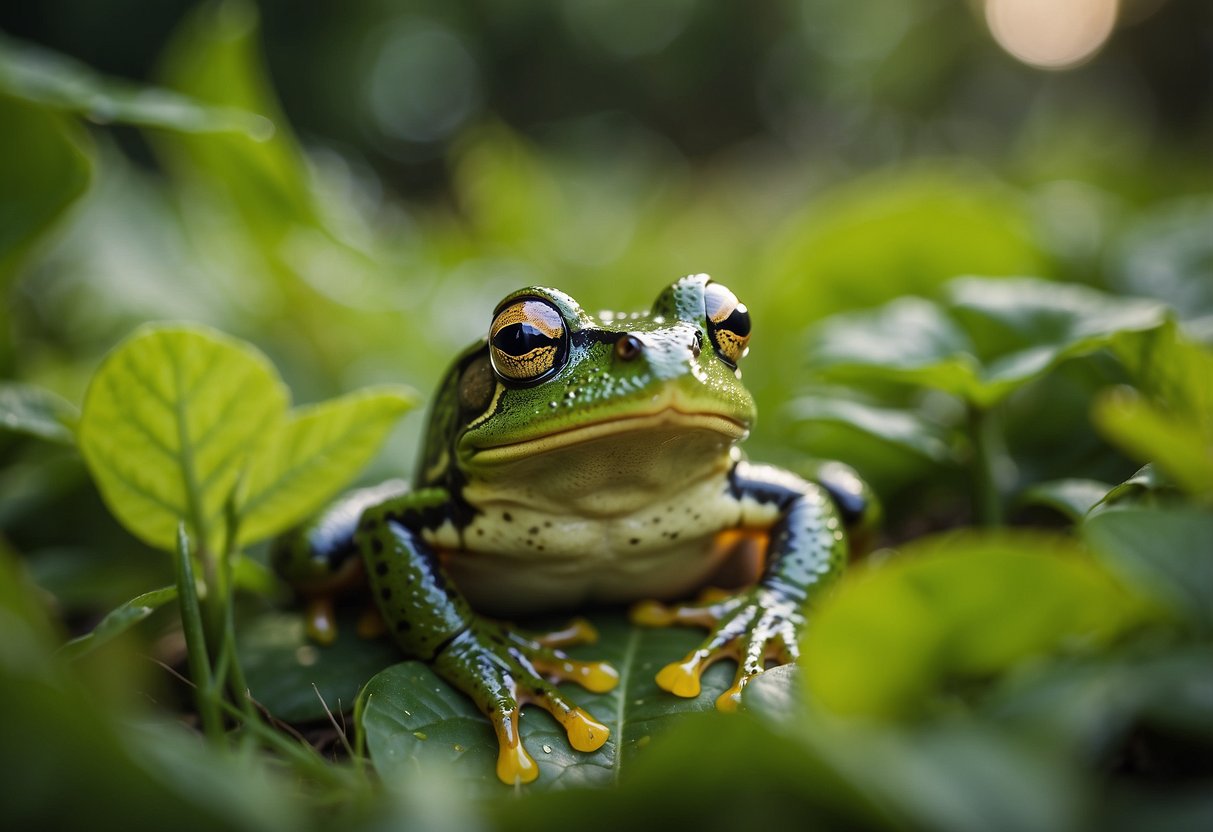
Having frogs around also benefits the health of your plants.
Their diet includes many pests that might otherwise damage crops.
By eating these pests, frogs ensure your garden stays lush and healthy without the use of chemicals.
Moreover, frogs are indicators of good water quality.
Their presence can tell you that your garden provides a clean habitat, which is crucial for their survival.
Watching frogs in the garden can also be a delightful experience, adding an educational and aesthetic value to the space.
Key Takeaways
- Frogs help manage pests naturally.
- Frogs promote healthy plants by eating harmful insects.
- Frogs indicate good water quality in the garden.
Ecological Significance of Frogs
Frogs play a vital role in gardens by controlling pest populations, acting as indicators of biodiversity, and improving soil health through their activities.
Pest Control
Frogs are natural predators of many garden pests.
They consume a large number of insects such as caterpillars, sow bugs, and cutworms.
Each night, a single frog can eat over 100 insects, reducing the need for chemical pesticides, which can harm other wildlife.
By keeping pest populations in check, frogs help maintain the health of plants and ensure a thriving garden.
Their presence is a natural and effective way to manage unwanted insects, promoting a balanced ecosystem.
Biodiversity Indicators
The presence of frogs in a garden is an indicator of a healthy and thriving environment.
Frogs require clean water, suitable habitats, and abundant food sources to survive.
Their sensitivity to pollutants and environmental changes makes them excellent markers of biodiversity.
If frogs are living in the garden, it suggests that the ecosystem is balanced and supports a wide range of species, from plants to other wildlife.
This biodiversity is crucial for a resilient garden that can withstand diseases and pests.
Soil Aeration
Frogs contribute to soil aeration by burrowing and moving through the soil.
This activity helps break up compacted soil, allowing air, water, and nutrients to reach plant roots more effectively.
Their burrowing also helps in the natural decomposition process by mixing organic matter into the soil.
As a result, the soil becomes more fertile and better structured, supporting the growth of healthy plants.
Frogs’ natural behaviors thus enhance soil quality, leading to more robust plant life and a productive garden environment.
Frogs as Natural Predators
Frogs play an essential role in garden ecosystems by acting as natural predators. They help control insect populations and prevent the overpopulation of certain species.
Reduction of Insect Populations
Frogs consume a vast number of insects each night.
This includes pests like mosquitoes, flies, and beetles. These insects can harm plants and spread diseases.
By reducing their numbers, frogs help keep your garden healthier.
For example, mosquitoes are often a big problem in gardens, biting both humans and animals.
Frogs can significantly reduce mosquito populations. This helps create a more comfortable and safer garden environment.
Also, frogs eating insects lessen the need for chemical pesticides. This can make your garden more organic and eco-friendly. It’s a natural way to maintain balance.
Limiting Overpopulation of Certain Species
Frogs also help in controlling the populations of species that might become too numerous.
For instance, slugs and snails can wreak havoc on plants, and frogs are known to eat these pests.
When certain species become too populous, they can damage the ecosystem.
Frogs help by keeping these kinds of populations in check. This maintains the harmony in the garden’s environment.
Creating a balanced ecosystem helps all garden plants and animals thrive. Frogs, by acting as predators, contribute significantly to this balance. This ensures that no single species dominates, leading to a more diverse and resilient garden.
Benefits to Plant Health
Frogs play a vital role in maintaining plant health in the garden. Their presence enhances pollination and contributes significantly to nutrient cycling.
Enhancing Pollination
Frogs help create a balanced ecosystem by managing pest populations, which indirectly benefits pollination.
By eating insects like mosquitoes, flies, and caterpillars, frogs reduce the number of pests that harm pollinators.
Bees and butterflies, essential for pollination, thrive better in an environment where pest levels are controlled naturally.
This means healthier and more abundant flowers and fruits.
In my garden, introducing a water source like a small pond has attracted frogs. This has noticeably improved the pollination process, resulting in more robust plant growth and higher yields.
Contribution to Nutrient Cycling
Frogs contribute to nutrient cycling by consuming pests and other insects.
When they digest these, frogs produce nutrient-rich waste that fertilizes the soil.
This natural fertilization boosts soil health, which in turn supports strong plant growth.
Frogs’ activities ensure that the nutrients from decayed insects and organic matter are effectively returned to the soil. This process helps maintain a balanced nutrient cycle.
I’ve observed that areas of my garden frequented by frogs tend to have richer, more fertile soil. This has led to healthier plants that are more resistant to diseases and pests.
Water Quality and Frogs
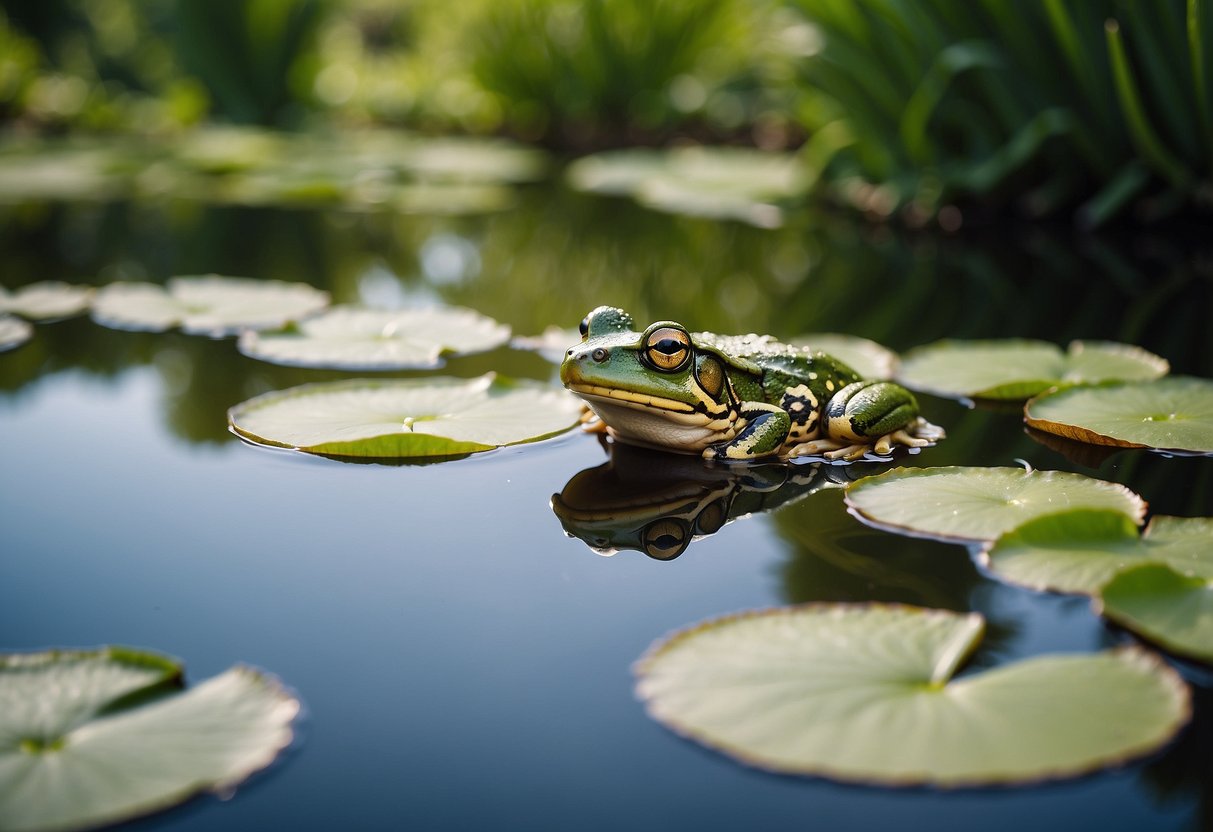
Frogs play a crucial role in maintaining water quality in your garden. They help control algae and keep the water clean and balanced.
Algae Control
Frogs can be a natural solution to controlling algae in garden ponds.
Algae growth can impact water quality, making it cloudy and unpleasant.
Adult frogs and their tadpoles consume algae and other plant materials. This feeding habit helps reduce the algae population, which, in turn, keeps the water clearer.
When fewer algae are present, oxygen levels in the water remain stable.
High oxygen levels are important for the health of aquatic plants and other creatures.
Installing a water feature like a small pond can support a healthy frog population.
Frogs need a clean environment, and as they thrive, they help the garden in return.
Freshwater sources, such as birdbaths or ponds, with native aquatic plants will provide the ideal habitat for frogs. By doing this, you ensure your garden’s water quality remains high.
Educational and Aesthetic Value

Frogs in the garden provide a unique blend of beauty and learning opportunities. Their presence can enhance the visual and acoustic ambiance, while also being an educational resource.
Visual and Acoustic Pleasure
Frogs add vibrant colors and patterns to a garden.
Species like the brightly colored tree frogs can be stunning to look at.
Their movements, often appearing suddenly and gracefully, bring life and energy to the garden.
The sounds frogs make can be soothing.
Frog calls, especially in the evening, create a peaceful atmosphere.
The chorus of different frog species adds a natural soundtrack that many people find relaxing and enjoyable.
Learning Opportunities
Frogs offer numerous educational benefits.
Observing them helps me learn about amphibian life cycles and behaviors.
Watching tadpoles transform into frogs can be a fascinating process, especially for children.
I can also use frogs to teach about ecosystems and biodiversity.
They are indicators of a healthy environment.
The presence of frogs often means clean water and abundant plant life.
By studying frogs, I gain insights into the interconnectedness of nature.
Engaging with frogs in the garden encourages curiosity and fosters a deeper appreciation for wildlife and conservation efforts.
Conservation Efforts and Community Engagement
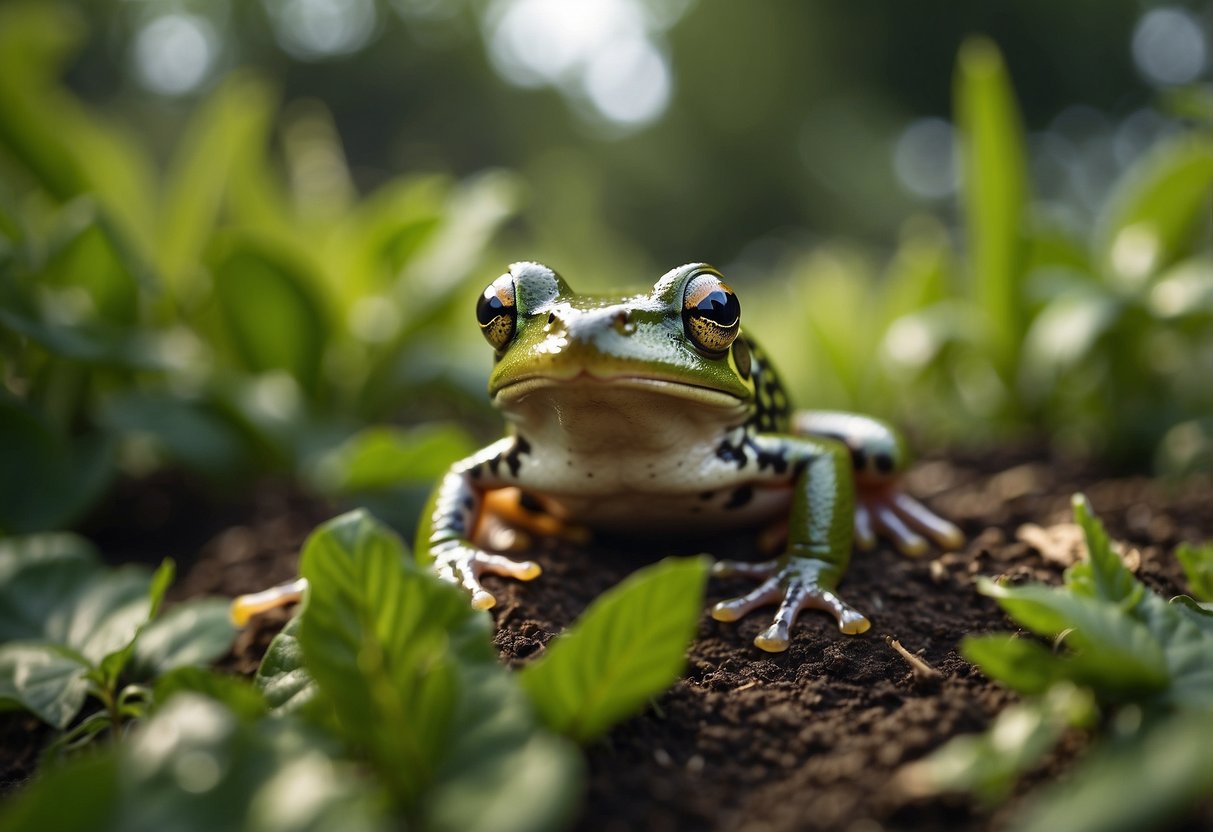
I am passionate about conservation efforts to protect frogs and their habitats. One such initiative is Save The Frogs Day, celebrated on April 28th each year.
This event, coordinated by SAVE THE FROGS!, mobilizes thousands of volunteers globally to raise awareness about the struggles of amphibians Save The Frogs Day.
I also encourage supporting frogs by creating native plant gardens.
Frogs are sensitive to pollution and habitat loss. By planting native species, I help restore and maintain a healthy local ecosystem Native Plant Garden.
Adding water features in my garden provides breeding grounds for frogs.
Ponds, even birdbaths, can attract moisture-loving amphibians, offering them a place to lay eggs and thrive Garden Water Features.
I find that community engagement plays a key role.
Educational programs and local events can raise awareness and inspire others to embrace conservation practices.
Together, we can make a significant impact.
Tips for Attracting Frogs to Your Garden
To draw frogs to my garden, I start with making a pond.
Frogs need water to breed, so having a garden pond or even a birdbath on the ground helps a lot. It’s essential to keep the water clean and add items like rocks and logs for frogs to rest.
I also avoid using chemicals like insecticides and herbicides. These can harm frogs.
Instead, I use natural pest control methods such as companion planting and composting. Frogs are sensitive, and they thrive in pesticide-free environments.
Creating shelters is another tip. Frogs need hiding spots to feel safe.
I place leaf piles, stones, and logs around my garden. These provide shelter and also help maintain damp conditions.
Providing a good food source is crucial. I plant a variety of plants that attract insects, which frogs feed on. This way, frogs have plenty to eat right in my garden.
Lastly, I keep the garden moist. Frogs prefer damp environments.
I sometimes use a sprinkler or a mister to maintain humidity, especially during dry periods.
Here are some quick tips:
ActionAdvantageBuild a pondProvides breeding ground for frogsAvoid chemicalsKeeps frogs safe from harmful substancesCreate sheltersOffers safe hiding spotsEncourage insectsEnsures a steady food supplyMaintain moistureKeeps the environment frog-friendly
Frequently Asked Questions
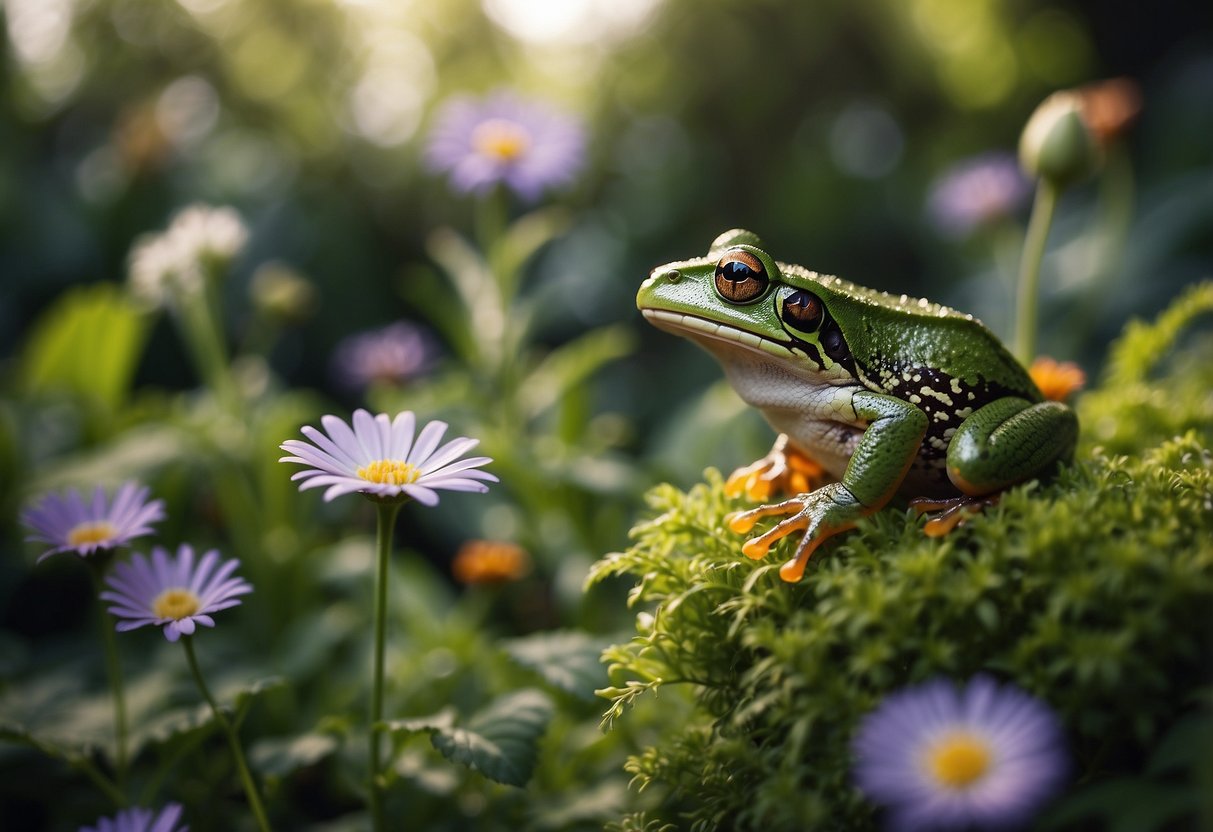
Frogs offer numerous ecological benefits in gardens. They serve as natural pest controllers and promote biodiversity, creating a balanced ecosystem. Here are some common questions about having frogs in your garden.
What are the ecological benefits of having frogs in my garden?
Having frogs in your garden helps maintain a healthy ecosystem. They contribute to the food chain by serving as both predators and prey.
Frogs eat a wide variety of insects and pests that can harm garden plants. They also support other wildlife by providing food for birds, snakes, and small mammals.
How do frogs contribute to pest control?
Frogs are natural pest controllers. They consume a wide range of insects such as mosquitoes, flies, and beetles.
This reduces the need for chemical pesticides, which can be harmful to the environment. By keeping pest populations in check, frogs help ensure that plants remain healthy and vibrant.
Can frogs thrive in a garden without a pond?
Yes, frogs can thrive in gardens without ponds, though a water source is beneficial. Certain species of frogs and toads prefer moist environments but do not require a permanent pond. Simple water features like birdbaths or shallow dishes can work well.
Additionally, providing shaded areas and native plants can create a frog-friendly environment.
What can I do to attract frogs to my garden ecosystem?
To attract frogs, provide a water source such as a small pond or water feature. Plant native species to attract the insects that frogs eat. Keep your garden pesticide-free to ensure a safe habitat.
Creating shaded, moist areas and providing ground cover like logs or rocks can also help attract frogs.
In what ways are frogs important for garden biodiversity?
Frogs enhance biodiversity by supporting various species within the garden ecosystem. They act as both predators and prey, helping maintain balanced populations of insects and other small animals.
Their presence indicates a healthy environment and contributes to the overall diversity of plant and animal life in the garden.
Are there any risks associated with having frogs in residential gardens?
While frogs are generally beneficial, some risks exist. Frogs can carry parasites and diseases that might affect other wildlife.
Additionally, certain species of frogs can be noisy, which might be a concern for some homeowners.
However, these risks are usually minor compared to the ecological benefits they provide.
For more information on frog-friendly gardening, you can read more about frogs in gardens.
